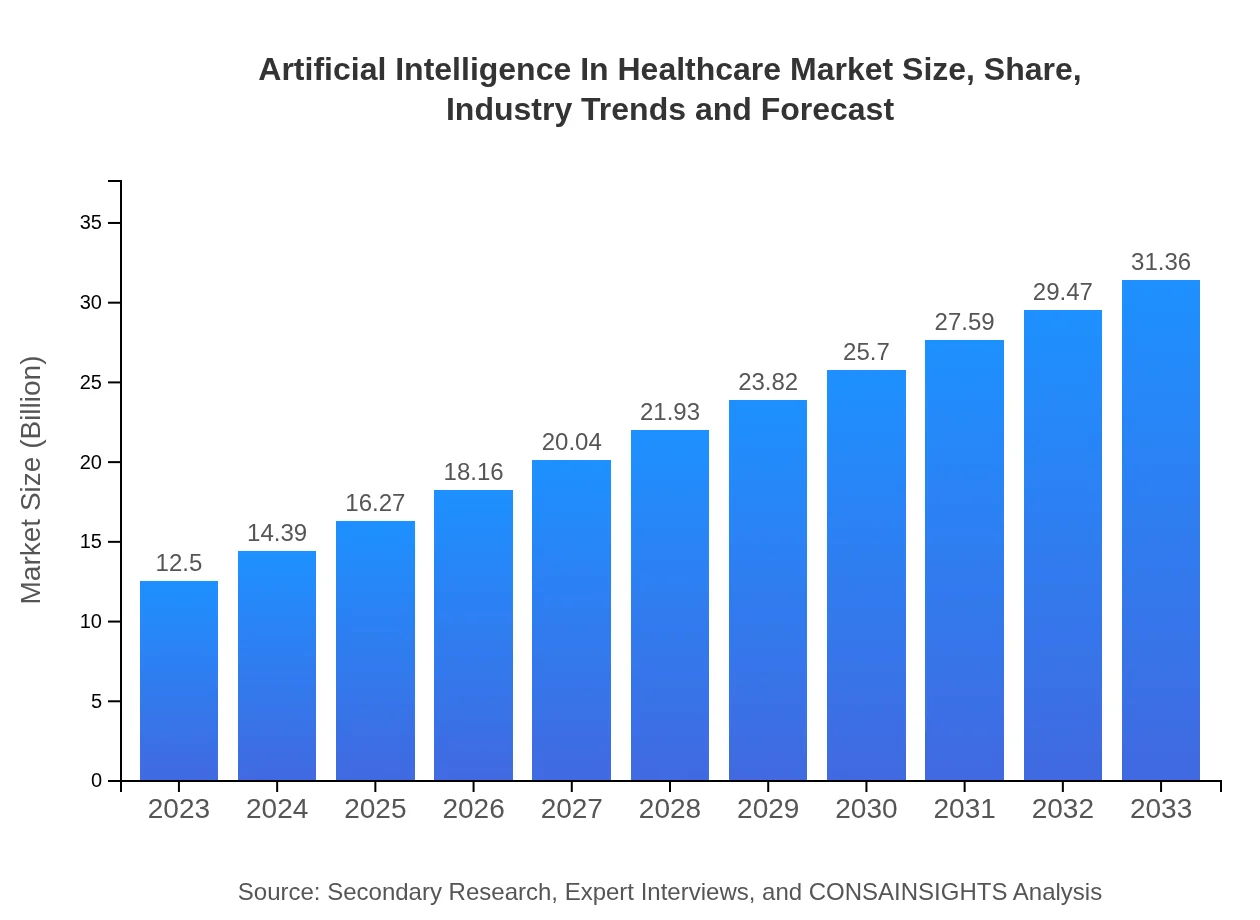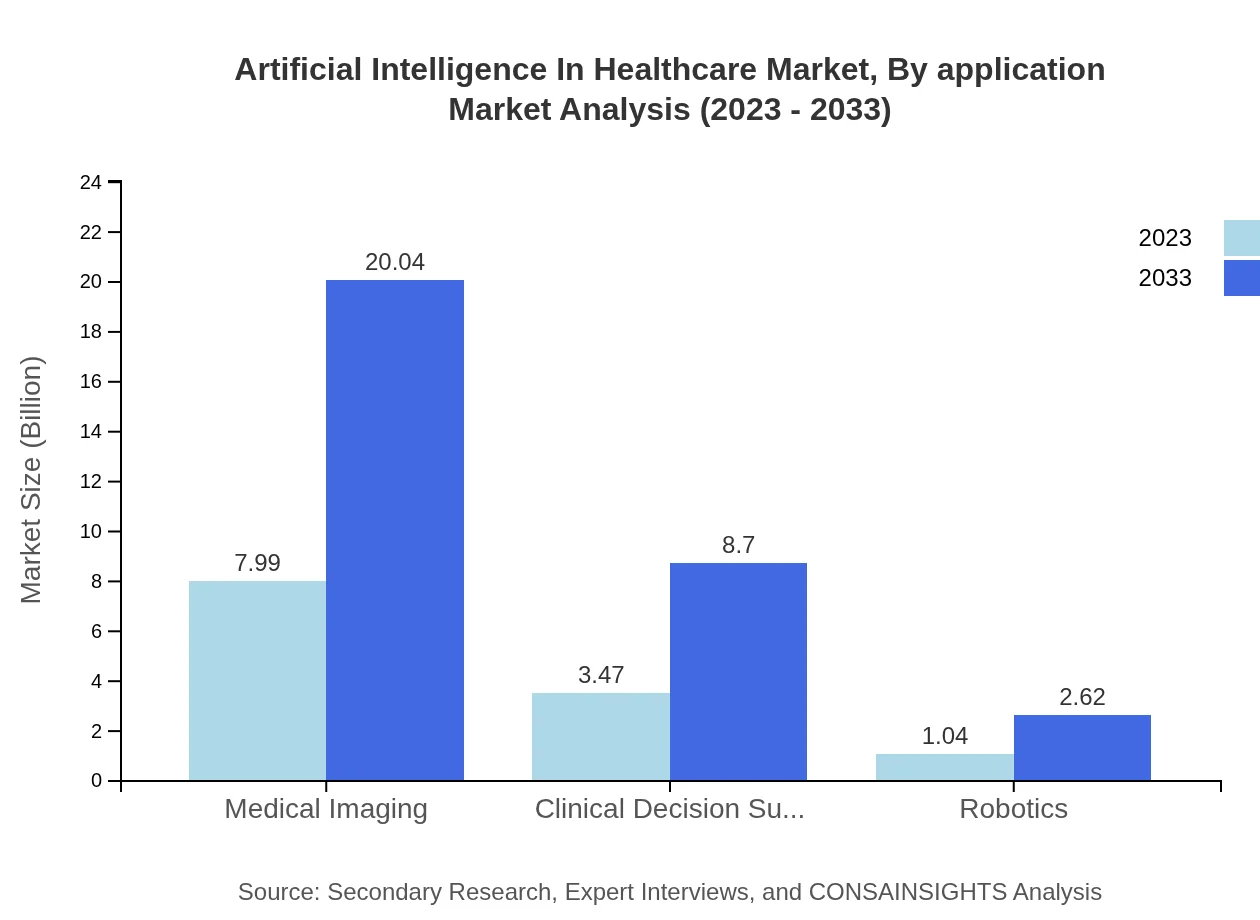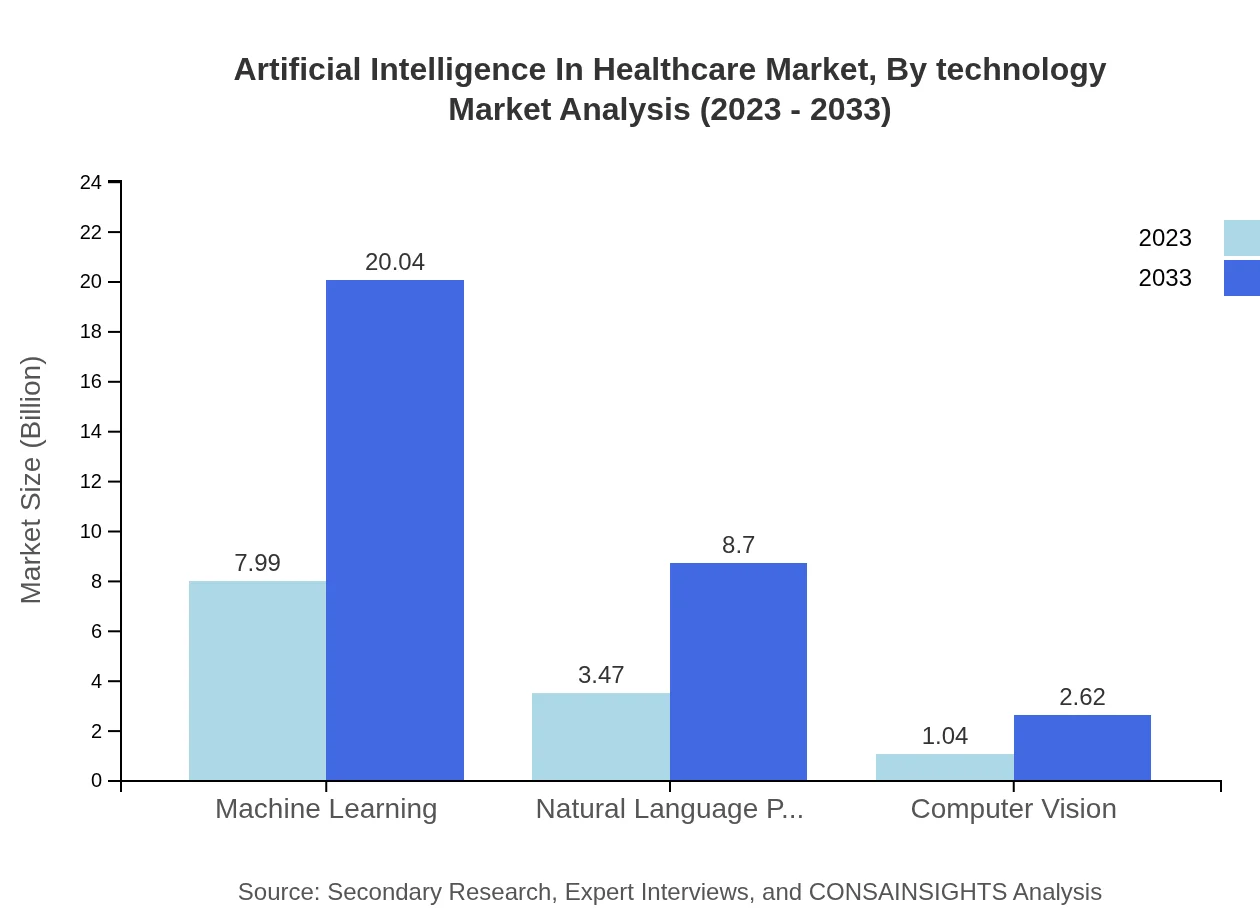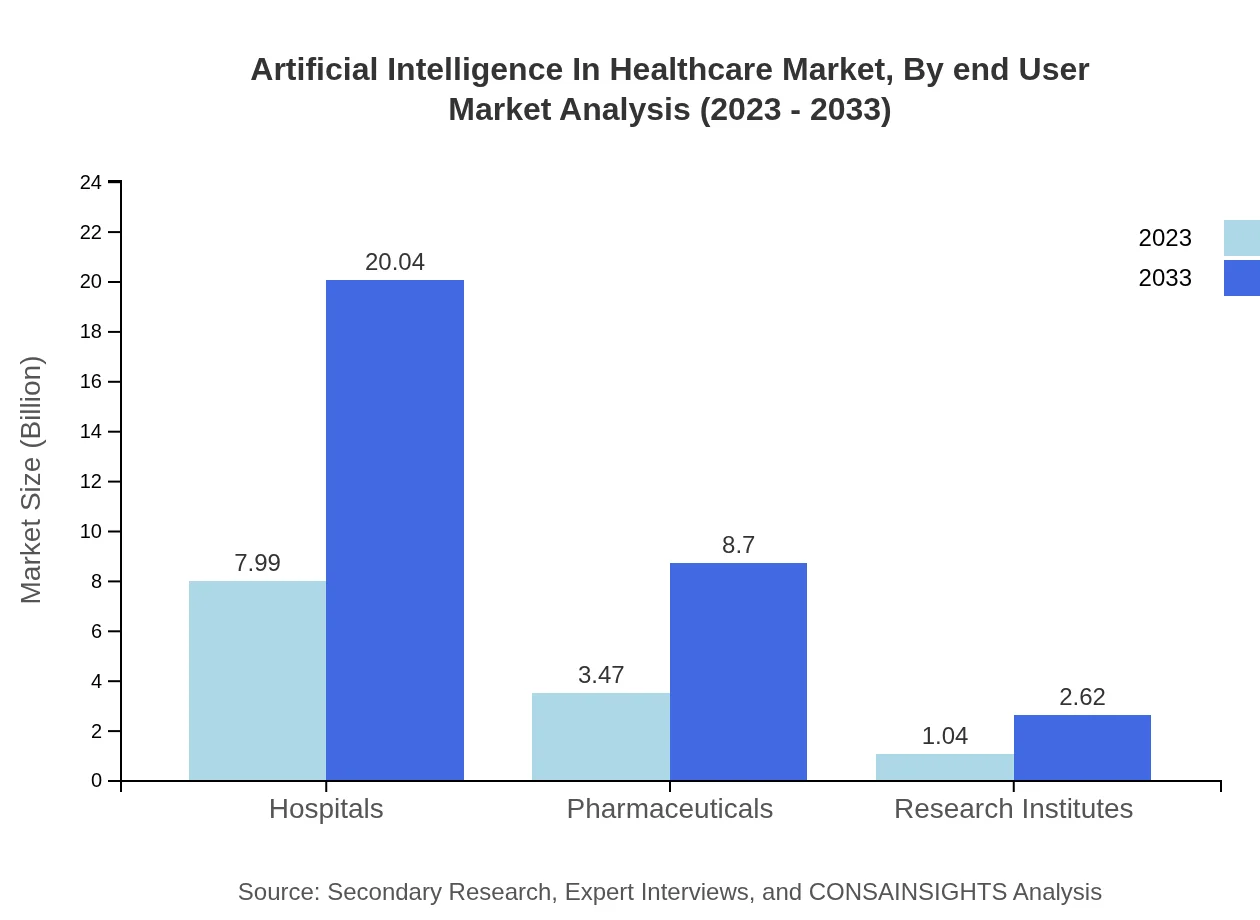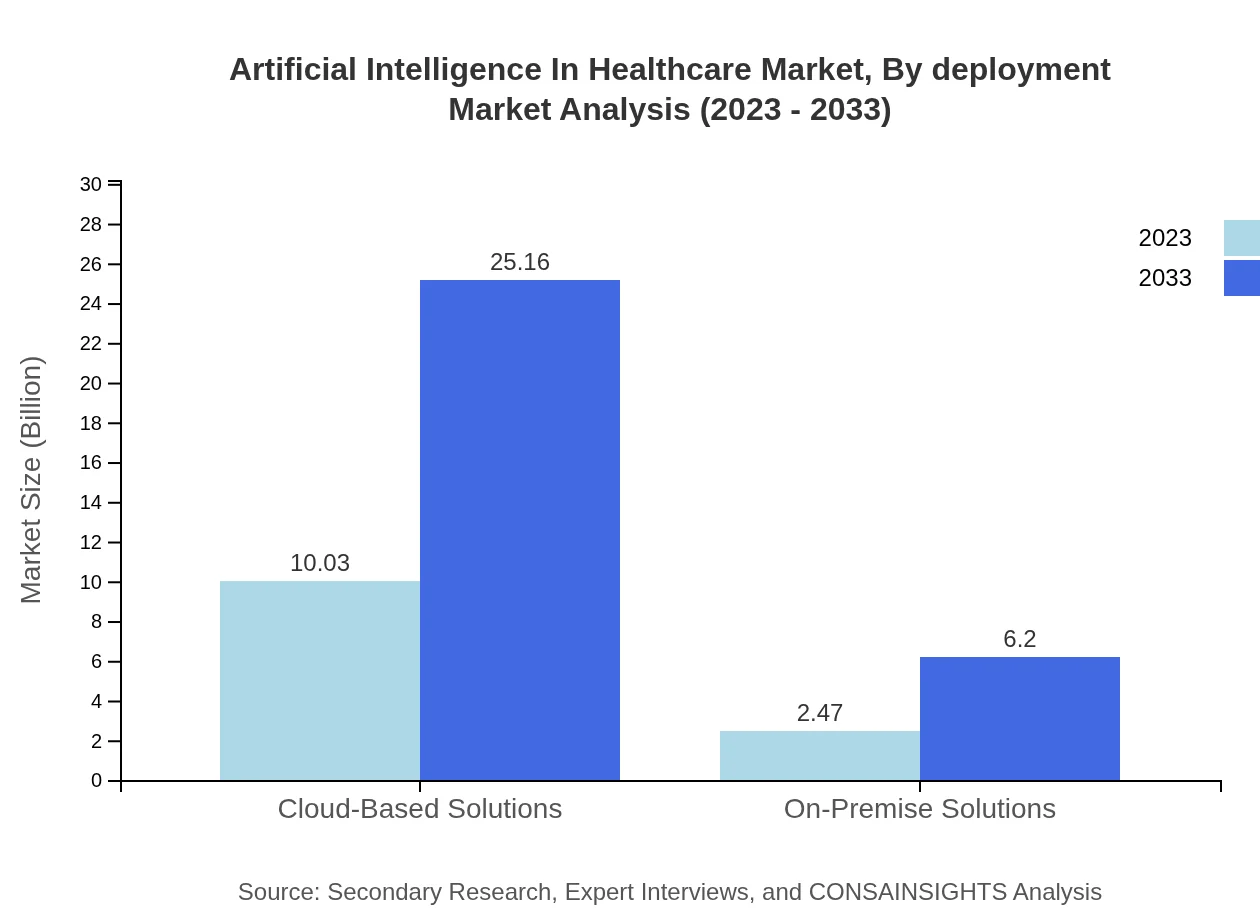Artificial Intelligence In Healthcare Market Report
Published Date: 31 January 2026 | Report Code: artificial-intelligence-in-healthcare
Artificial Intelligence In Healthcare Market Size, Share, Industry Trends and Forecast to 2033
This report provides an in-depth analysis of the Artificial Intelligence in Healthcare market, covering current trends, market size, and projections up to 2033. It offers insights into regional performance, industry analysis, and highlights key players shaping the future of healthcare technology.
| Metric | Value |
|---|---|
| Study Period | 2023 - 2033 |
| 2023 Market Size | $12.50 Billion |
| CAGR (2023-2033) | 9.3% |
| 2033 Market Size | $31.36 Billion |
| Top Companies | IBM Watson Health, Google Health, Microsoft Healthcare, Philips Healthcare, Siemens Healthineers |
| Last Modified Date | 31 January 2026 |
Artificial Intelligence In Healthcare Market Overview
Customize Artificial Intelligence In Healthcare Market Report market research report
- ✔ Get in-depth analysis of Artificial Intelligence In Healthcare market size, growth, and forecasts.
- ✔ Understand Artificial Intelligence In Healthcare's regional dynamics and industry-specific trends.
- ✔ Identify potential applications, end-user demand, and growth segments in Artificial Intelligence In Healthcare
What is the Market Size & CAGR of Artificial Intelligence In Healthcare market in 2023?
Artificial Intelligence In Healthcare Industry Analysis
Artificial Intelligence In Healthcare Market Segmentation and Scope
Tell us your focus area and get a customized research report.
Artificial Intelligence In Healthcare Market Analysis Report by Region
Europe Artificial Intelligence In Healthcare Market Report:
Europe's AI in Healthcare market is anticipated to expand from 3.54 billion USD in 2023 to 8.89 billion USD by 2033. The region focuses on enhancing healthcare services and patient outcomes while navigating stringent regulations. Collaborative efforts to explore AI possibilities in telemedicine and drug discovery further exemplify Europe's commitment to leveraging AI in healthcare.Asia Pacific Artificial Intelligence In Healthcare Market Report:
In the Asia Pacific region, the AI in Healthcare market is expected to grow from 2.49 billion USD in 2023 to 6.25 billion USD in 2033. This growth is fueled by increasing investments in digital health technologies and a rising emphasis on improving healthcare outcomes. Many countries within this region are rapidly adopting AI to enhance healthcare services, demonstrate efficiency, and reduce costs.North America Artificial Intelligence In Healthcare Market Report:
North America exhibits the largest market share, with a growth from 4.45 billion USD in 2023 to 11.16 billion USD in 2033. This growth trajectory is attributed to the presence of leading technology and healthcare companies driving innovation, robust regulatory frameworks, and increasing consumer expectations regarding efficient healthcare delivery, thereby propelling widespread adoption of AI solutions.South America Artificial Intelligence In Healthcare Market Report:
The South American market for AI in Healthcare is projected to rise from 0.56 billion USD in 2023 to 1.40 billion USD by 2033. The region is witnessing a gradual acceptance of AI technologies with the aim of mitigating inefficiencies within healthcare frameworks and prioritizing patient-centric care as a long-term goal.Middle East & Africa Artificial Intelligence In Healthcare Market Report:
In the Middle East and Africa, the market is expected to grow from 1.46 billion USD in 2023 to 3.66 billion USD in 2033. The governments in this region are increasingly pursuing AI initiatives to improve healthcare infrastructure, enhance patient data management, and streamline service delivery to meet rising demands.Tell us your focus area and get a customized research report.
Artificial Intelligence In Healthcare Market Analysis By Application
By application, the market highlights several critical segments: Hospital management systems, medical imaging, diagnostics, and clinical decision support systems. In 2023, hospitals represent the largest segment with a market size of 7.99 billion USD, projected to reach 20.04 billion USD in 2033. Clinical decision support and diagnostics also hold significant shares, driven primarily by the need for enhanced accuracy and efficiency in patient care.
Artificial Intelligence In Healthcare Market Analysis By Technology
The technology segment showcases vital components such as machine learning, natural language processing, and computer vision. Machine learning holds the largest market share in 2023 at 7.99 billion USD (63.92%), projected to grow to 20.04 billion USD by 2033. Natural language processing, while smaller at 3.47 billion USD (27.73%), showcases significant potential for growth, promising effective communication between healthcare providers and patient data systems.
Artificial Intelligence In Healthcare Market Analysis By End User
The end-users of AI in healthcare span across hospitals, pharmaceutical companies, research institutes, and individual healthcare practitioners. Hospitals account for the majority of the market share in 2023 and will continue to play a crucial role as they adopt diverse AI applications to improve their operational workflows and patient care protocols.
Artificial Intelligence In Healthcare Market Analysis By Deployment
Deployment types affect how AI solutions are implemented in healthcare settings, segmented into cloud-based solutions and on-premise solutions. Cloud-based solutions dominate, with a market size of 10.03 billion USD (80.23%) in 2023, anticipating exponential growth by 2033, owing to the benefits of scalability and accessibility it provides healthcare institutions.
Artificial Intelligence In Healthcare Market Trends and Future Forecast
Tell us your focus area and get a customized research report.
Global Market Leaders and Top Companies in Artificial Intelligence In Healthcare Industry
IBM Watson Health:
A subsidiary of IBM, Watson Health leverages AI technologies to assist healthcare providers in making data-driven decisions and optimizing patient care through advanced analytics.Google Health:
Google Health employs AI to improve health outcomes by providing tools that can analyze patient data, enhance diagnostics, and support medical researchers.Microsoft Healthcare:
Microsoft's Healthcare division integrates AI solutions with cloud technology to enhance operational efficiencies and provide comprehensive patient insights.Philips Healthcare:
Philips utilizes AI in its medical devices and health technology systems, seeking to expedite innovations in imaging and patient monitoring.Siemens Healthineers:
Siemens focuses on developing AI-powered imaging solutions that enhance diagnostic capabilities and clinical workflows improving patient safety and care.We're grateful to work with incredible clients.









FAQs
What is the market size of Artificial Intelligence in Healthcare?
The global Artificial Intelligence in Healthcare market is projected to grow from $12.5 billion in 2023 to a significant size by 2033, with a compound annual growth rate (CAGR) of 9.3%. This indicates a strong upward trajectory for AI applications in healthcare.
What are the key market players or companies in this Artificial Intelligence in Healthcare industry?
Key players in the Artificial Intelligence in Healthcare market encompass tech giants and specialized firms that develop innovative solutions for healthcare purposes. These include companies focusing on machine learning, natural language processing, and medical imaging technologies.
What are the primary factors driving the growth in the Artificial Intelligence in Healthcare industry?
The growth of Artificial Intelligence in Healthcare is driven by advancements in technology, the need for improved patient outcomes, rising healthcare costs, and the shift towards personalized medicine. Increased investment and adoption of AI tools in clinical settings further accelerate market development.
Which region is the fastest Growing in the Artificial Intelligence in Healthcare?
North America is the fastest-growing region in the Artificial Intelligence in Healthcare market, expected to expand from $4.45 billion in 2023 to $11.16 billion by 2033. Europe and Asia Pacific also show significant growth potential in this market.
Does ConsaInsights provide customized market report data for the Artificial Intelligence in Healthcare industry?
Yes, Consainsights offers customized market research reports tailored to specific needs within the Artificial Intelligence in Healthcare industry, allowing stakeholders to gain insights that matter most to their business objectives and strategies.
What deliverables can I expect from this Artificial Intelligence in Healthcare market research project?
Expect comprehensive market analytics, competitive landscape assessments, regional performance evaluations, segment analyses, and actionable insights tailored to drive informed decision-making in the Artificial Intelligence in Healthcare market.
What are the market trends of Artificial Intelligence in Healthcare?
Current trends in the Artificial Intelligence in Healthcare market include increasing integration of AI in clinical workflows, growing reliance on data analytics, the rise of telehealth services, and advancements in predictive analytics to enhance patient care and operational efficiency.

